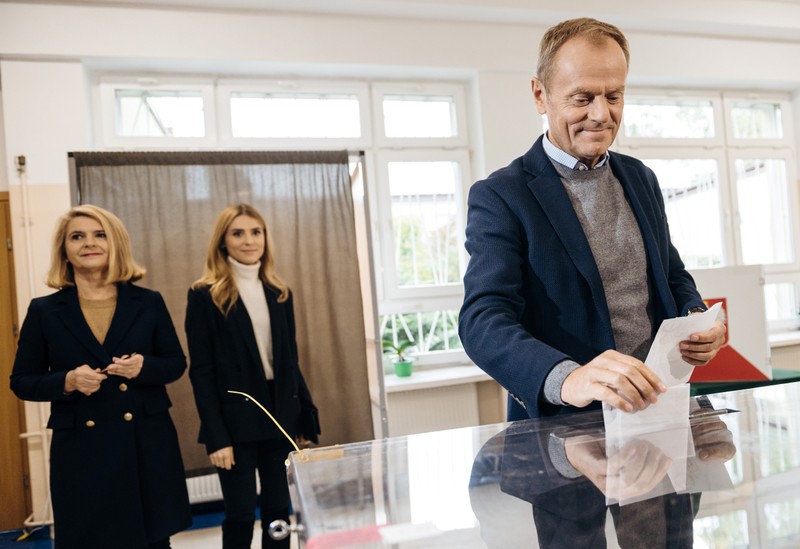
European Council President Donald Tusk casts his vote during parliamentary election, next to his wife Malgorzata and daughter Katazyna, at a polling station in Sopot, Poland October 13, 2019. Bartosz Banka/Agencja Gazeta via REUTERS
October 13, 2019
By Alicja Ptak and Anna Pruchnicka
WARSAW, Poland (Reuters) – Turnout was high in Poland’s parliamentary election on Sunday, as voters decided whether to award a second term to the nationalists amid growing unease within the European Union about their commitment to democratic standards.
The Law and Justice party (PiS) is expected to win more votes than it did in 2015 and may get enough parliamentary seats to continue to govern alone – but the shift in the political climate that it has presided over in the past four years has divided the country.
“There is a great polarization of attitudes now,” said Krzysztof Michalec, 56, a former opposition activist during communism as he went to vote in Warsaw.
“Now when I talk with my mother I practice the art of avoidance, I don’t get into any ideological discussions with her,” he said as he waited in the sunshine to see PiS leader Jaroslaw Kaczynski cast his vote.
Polls opened at 0500 GMT and will close at 1900 GMT. At 1500 GMT the turnout was 45.94%, seven percentage points higher than at the same time in the previous parliamentary election in 2015.
PiS has cast the election as a choice between a society rooted in traditional Catholic values and a liberal order that promotes a chosen few and undermines family life.
Opposition parties and Poland’s EU partners say the outgoing government has undermined the independence of the judiciary and the media and made Poland less welcoming for sexual and ethnic minorities.
Surveys show PiS winning 40-46% of votes, which may give the party an absolute majority. But it might need to form a coalition, which would raise the possibility of the far-right Confederation – one of three smaller groups that might garner the 5% of votes needed to enter parliament – becoming part of government.
Polling 19-26%, the centrist Civic Coalition – an umbrella group that includes the Civic Platform formerly led by EU Council President Donald Tusk – looks certain to continue forming the main opposition.
Its candidate for prime minister, Malgorzata Kidawa-Blonska, on Thursday accused Kaczynski of destroying democracy and seeking to sow further divisions. Support for the opposition is strongest in urban centers, where anti-PiS protests have previously drawn thousands of people.
CHURCH AND STATE
One of the foundations of PiS success is the way it has tapped into anger among poorer Poles who have missed out on prosperity since the collapse of communism in 1989, mixing nationalist rhetoric with a vast welfare program that an economic boom has allowed it to implement.
It has drawn on the deeply-rooted popularity of the Catholic Church. Top PiS officials regularly attend Church events and the party has espoused stronger religious values in public life.
The Church does not openly back any party but senior officials have given the PiS tacit support.
During campaigning, PiS has called lesbian, gay, bisexual and transgender (LGBT) rights an invasive foreign influence that threatens Poland’s national identity.
The party has also shifted Poland’s foreign policy away from the European mainstream, becoming a leading proponent of calls to take some powers away from the EU, with which Warsaw is embroiled in a long-running row over judicial and media reforms.
Brussels has taken legal action to force Polish authorities to row back on legislation it says has politicized the courts.
PiS says the reforms are needed to make the court system fairer and more efficient and plans further changes if it is re-elected.
“A lack of independent courts is not part of the Polish tradition,” Kidawa-Blonska said on Friday.
PiS has also sought closer ties with U.S. President Donald Trump, with whom it shares views on coal mining, climate and abortion – fuelling concern among some western EU diplomats that Trump could use the biggest of the EU’s ex-communist states to sow discord in Brussels over issues such as Iran.
Deeply distrustful of its former Soviet master, Poland has persuaded Trump to bolster Washington’s military presence on Polish soil to counter Russia’s growing assertiveness since its 2014 annexation of Crimea from Ukraine.
On the economy, PiS has promised to shake off the post-communist Polish model that relied on cheap labor by more than doubling the minimum wage over eight years.
Some economists say the party’s already vast social spending has exposed the economy to too much risk at the time of an economic slowdown in the West, while opposition critics say it has deprived the health care and education systems of funding.
But markets are largely sanguine about the prospect of another PiS government.
(Reporting by Warsaw bureau; Writing by Justyna Pawlak; Editing by John Stonestreet, Raissa Kasolowsky and Emelia Sithole-Matarise)

